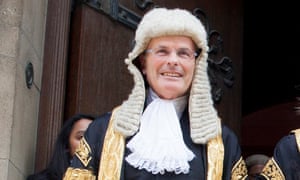Former top judge lambasts Grayling and Truss in memoir
Lord Dyson, a former master of the rolls, highlights the difficult relationship between judiciary and senior politicians

The former lord chancellor Chris Grayling
“never believed access to social justice” was important while Liz Truss
was a “disaster” in the same role, according to a highly revealing
memoir by one of the country’s most senior, recently retired judges.
In his autobiography, Lord Dyson, formerly master of the rolls and a supreme court justice, records how he managed to “water down” government cuts to legal aid, regrets the downgrading of the justice secretary’s position and deplores the rise of antisemitism.
He also chronicles his ascent through the establishment: relating the Queen’s disappointment at the disappearance of gold-plated teaspoons from Buckingham Palace garden parties, dismisses a speech by Boris Johnson as “polished but rather pointless”, and dodges an offer from Philip Hammond to “educate” him about the military’s difficulties.
Dyson, now 76, stood down in 2016 as master of the rolls, head of civil justice in England and Wales. Born in wartime Leeds, he attended the local grammar school then the University of Oxford. After working as a barrister, he became a high court judge and served on the supreme court for several years.
His recollections, A Judge’s Journey, highlights the
sometimes awkward relationship between judges and senior politicians as
they mingle socially and cooperate in administering what has become a
severely underfunded justice system.In his autobiography, Lord Dyson, formerly master of the rolls and a supreme court justice, records how he managed to “water down” government cuts to legal aid, regrets the downgrading of the justice secretary’s position and deplores the rise of antisemitism.
He also chronicles his ascent through the establishment: relating the Queen’s disappointment at the disappearance of gold-plated teaspoons from Buckingham Palace garden parties, dismisses a speech by Boris Johnson as “polished but rather pointless”, and dodges an offer from Philip Hammond to “educate” him about the military’s difficulties.
Dyson, now 76, stood down in 2016 as master of the rolls, head of civil justice in England and Wales. Born in wartime Leeds, he attended the local grammar school then the University of Oxford. After working as a barrister, he became a high court judge and served on the supreme court for several years.
Dyson’s period in high judicial office coincided with the coalition government’s imposition of austerity. He was sworn in as master of the rolls in October 2012 on the same day Grayling, then justice secretary, took his oath as lord chancellor.
Grayling, he recounted, felt strongly there were too many judicial review cases funded by legal aid and that public authorities were spending too much time defending them. “In the end, I was able to persuade him water down some of his proposals, but not by much,” Dyson added.
“I was never convinced that [Grayling] believed that access to civil justice was an important social good or that he really appreciated the importance of the rule of law.”
Michael Gove, who succeeded Grayling, was, by contrast, “very quick to get the point” and “genuinely believed that it was important for the rule of law to have a strong independent bar”.
Gove was replaced soon, however, by Truss, who is now the trade secretary. She notoriously failed to defend senior judges when the Daily Mail in 2016 called those who ruled on the article 50 Brexit case “enemies of the people”.
Truss, Dyson suggested, “was more concerned to avoid upsetting the media than to perform her statutory duty of protecting the independence of the judiciary”. Her time as justice secretary “was to prove disastrous”.
Dyson calls it “highly regrettable” that the government regards “the office of lord chancellor and secretary of state for justice as being relatively unimportant. Sadly there are few votes in justice.”
He goes on: “It is deeply unsatisfactory that in the less than three years that elapsed between May 2015 and January 2018, no fewer than four ministers held the office [Gove, Truss, David Lidington and David Gauke].”
As a supreme court justice, Dyson was invited every year to the Royal Tea Tent at a Buckingham Palace garden party. He recounts a “long conversation” with Theresa May, then home secretary, who “wanted to talk about legal challenges to some of her decisions”. She had an impressive grasp of the issues and was “very charming”.
Dyson records the Queen telling “an admiring group of guests ... that on one occasion when it was raining, she allowed some people who were not Royal Tent guests to come into the tent to shelter from the rain. She told us that, when they had left, some of the gold-plated teaspoons had disappeared. ‘Rather disappointing,’ she said.”
On sharing an after-dinner speech platform with Johnson, Dyson writes: “He was editor of the Spectator magazine at the time and much sought after ... He made a polished but rather pointless speech, which comprised wall to wall jokes of no relevance to surveyors [who were giving the dinner].”
At another dinner in 2012, to celebrate the 800th anniversary of Magna Carta, Dyson sat next to Hammond, then defence secretary, who was critical of a supreme court decision that the Ministry of Defence could be sued for providing soldiers with inadequate equipment.
Hammond insisted that the judgment showed “a complete lack of understanding of the practicalities and difficulties facing the military”, Dyson writes. “He offered to meet me in order to educate me and explain why the decision was so bad. I did not take up the offer.”
One of the dangers of being a judge, Dyson says, is of “becoming desensitised by excessive exposure to the same kinds of case, such as applications for permission to appeal by litigants in person”, especially in immigration and family law.
The atmosphere in the supreme court, he said, was intense. “At the beginning I was rather lonely and felt under pressure to perform well.” He worried about being judged by “clever colleagues”. He had the “impression that at least some of them wrote judgments to impress each other and to win over colleagues to their point of view. I may have been guilty of this myself.”
Dyson, whose family originally came from eastern Europe, says that being Jewish has always been important to him – “a core part of my identity”. He “hardly ever” encountered antisemitism himself but was on the “security rota” to provide protection at his synagogue.
Antisemitism, he warns, has become “more overt and widespread”. The accusation that “Israel is an apartheid state is grotesque”. Those on the left are particularly prone to subjecting Israel to double standards when comparing human rights records, he writes.
Dyson, who describes himself as “strongly opposed to Brexit”, records his disappointment at not being promoted to the House of Lords. David Cameron, he said, had “cleared the way” for a peerage but “May had other ideas”.




No comments:
Post a Comment